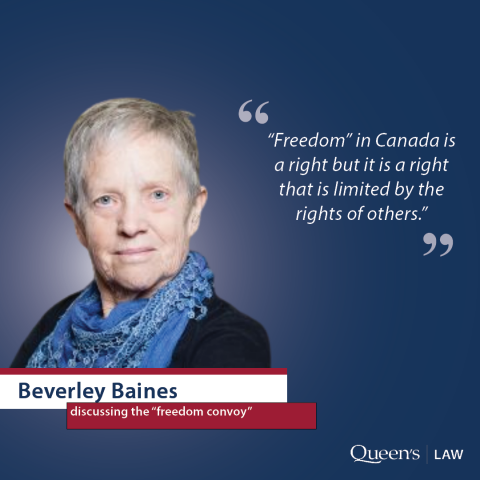
Professor Beverley Baines, a public and constitutional law expert specializing in Charter rights, shares her insight on whether any constitutional rights are being violated in the now 11-day “freedom convoy” taking place in Canada.
“We’re just fed-up,” a trucker blocking Windsor’s Ambassador Bridge connecting Canada to the U.S. told the media. That’s not a constitutional issue.
“Some of us are vaccinated,” said another. That’s not a constitutional issue.
“We’ve lost our jobs, our families have no money to eat, our kids can’t go to school,” so we’ll make sure our fellow citizens share our pain by blocking trade at international borders, roads in front of legislatures, and experiences of COVID-normalcy like sleeping without air horns.
To which our labour arbitrators say your employers offered workplace accommodations, our courts say your actions might constitute tortious nuisance, and our police say insurrection. But those are not constitutional responses to unconstitutional activities.
What would make being fed-up a constitutional issue? Instigating three kinds of institutionalized divisiveness.
First, setting provincial and municipal legislators against federal parliamentarians; that’s called “federalism” and thus far controversies about federalism have not even surfaced in the “truckers’” current media laments.
Second, setting courts against legislators but to date the “truckers” have distained legal action until yesterday when called to account as defendants in the class action framed in nuisance and filed by some Ottawa citizens.
Third, setting white middle-class mostly male minorities against – that is “othering” – all the remaining minority identities who thought they were acting democratically when they elected federal politicians to represent them six months ago. In other words, creating or trying to create new institutionalized versions of power-sharing.
To their credit Indigenous peoples in Canada led the way in seeking debate about changing Canada’s constitutional structures from the ones Quebec forerunners negotiated in 1867. Quebecers got a provincial government.
Today and for a long time, Indigenous peoples have asserted their rights to self-government and most other Canadians recognize current constitutional relationships need to change to recognize these assertions. True, we do not put our money where our mouths are.
Do “fed-up” truckers claim to emulate the very valid self-government justifications of the Indigenous peoples? Do the “fed-up” truckers seek the creation of their very own provincial government like the Quebecers did?
Put simply does being “fed-up” raise a constitutional issue and if so, what is it?
Not crying for “freedom.” Truckers indeed, all Canadians, already have that in the Canadian Charter of Rights and Freedoms, albeit very distinctively from the Americans on whom they rely for money, guns, and strategizing.
“Freedom” in Canada is a right but it is a right that is limited by the rights of others. The very first Canadian Charter case made this clear by interpreting Section 1 as asserting that “no rights are absolute.”
Ranged against the right to freedom are other Charter rights to democracy, to mobility, to life liberty and security of the person, and to equality for starters. Does being “fed-up” trump those rights?
This is a constitutional question. Are the truckers willing to ask it of the Canadian courts?
Or are they “insurrectionists” (as the Ottawa police claimed) willing to avail themselves of the freedom in the Canadian Charter but not live with its limits?
Professor Beverley Baines, a long-established equality rights advocate, served as a feminist constitutional consultant to the Canadian Advisory Council on the Status of Women and to the Ad Hoc Committee of Women on the Constitution during the Charter debates of 1980-1982. She is currently working on the project, “No Rights Are Absolute,” funded by the Social Science and Humanities Research Council.